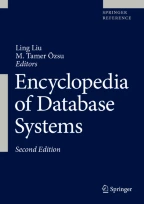Synonyms
Object query language
Definition
OQL was developed to play the role of SQL for Object-Oriented Databases, especially those adhering to the ODMG Standard [4] where the language is defined. Unlike SQL, OQL is a functional language, and its operators can be composed to an arbitrary level of nesting within a query provided the query remains type-correct. Fegaras and Maier [8] have shown how OQL expressions have a direct translation into monoid Comprehensions.
Optimisation techniques for OQL that exploit its inherent functional nature are discussed in [5, 6, 8]. OQL has been influential in the development of the SQL3 standard and also the functional core of the XQuery language for XML. Thus optimisation techniques developed for OQL are also applicable to these languages.
Key Points
The fundamental modelling concept of object identifiersfor entity instances was accepted into the database mainstream in the late 1980s, and the move to using SQL-like syntax for querying such data...
Access this chapter
Tax calculation will be finalised at checkout
Purchases are for personal use only
Recommended Reading
Bancilhon F, Delobel C, Kanellakis PC. Building an object-oriented database system, the story of O2. Los Altos: Morgan Kaufmann; 1992.
Beech D. A foundation of evolution from relational to object databases. In: Advances in Database Technology. Proceedings of the 1st International Conference on Extending Database Technology; 1988. p. 251–70.
Buneman P, Libkin L, Suciu D, Tannen V, Wong L. Comprehension syntax. ACM SIGMOD Rec. 1994;23(1):87–96.
Cattell RGG, editor. The object data standard: ODMG 3.0. Los Altos: Morgan Kaufmann; 2000.
Cluet S, Delobel C. A general framework for the optimization of object-oriented queries. In: Proceedings of the ACM SIGMOD International Conference on Management of Data; 1992. p. 383–92.
Fegaras L. Query unnesting in object-oriented databases. In: Proceedings of the ACM SIGMOD International Conference on Management of Data; 1998. p. 49–60.
Fegaras L. Query processing and optimization in λ-DB, Chapter 13. In: Gray PMD, Kerschberg L, King PJH, Poulovassilis A, editors. The functional approach to data management. Berlin: Springer; 2004.
Fegaras L, Maier D. Towards an effective calculus for Object Query Languages. In: Proceedings of the ACM SIGMOD International Conference on Management of Data; 1995. p. 47–58.
Author information
Authors and Affiliations
Corresponding author
Editor information
Editors and Affiliations
Section Editor information
Rights and permissions
Copyright information
© 2018 Springer Science+Business Media, LLC, part of Springer Nature
About this entry
Cite this entry
Gray, P.M.D. (2018). OQL. In: Liu, L., Özsu, M.T. (eds) Encyclopedia of Database Systems. Springer, New York, NY. https://doi.org/10.1007/978-1-4614-8265-9_1118
Download citation
DOI: https://doi.org/10.1007/978-1-4614-8265-9_1118
Published:
Publisher Name: Springer, New York, NY
Print ISBN: 978-1-4614-8266-6
Online ISBN: 978-1-4614-8265-9
eBook Packages: Computer ScienceReference Module Computer Science and Engineering
